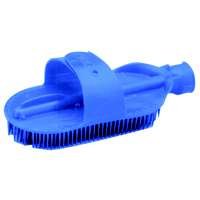 |
| That's why we call him Lefty the Bad Elf |
When You Arrive at the Hunt Meet
There are a few foxhunters who will arrive REALLY early to the meet. This is probably the ideal thing to do so you can get ready at a relaxed pace, and keep your horse as quiet and calm as possible, particularly if you have a green horse. But honestly very few people do this. It is very common to arrive 20 minutes to 5 minutes (!) before the huntsman blows the horn and it's time to move off.So if you are in that latter group, you want to be able to unload your horse and GO. This is why I recommended trailering your horse tacked up in the previous post. But being able to just unload and go takes some homework and preparation weeks or even months beforehand. You don't want a horse who is hard to load or unload, or who freaks out when left on the trailer without a buddy, or who leaps out like a bat out of hell. Hunt trail rides are a good time to sort out these issues in a low-stress environment, but don't try to "school at the show."
For the sake of this post I'll assume you already have done all the horse training you need to be safe. What you really want to know is how to park your trailer and get on your horse looking as polished as possible in as little time as possible.
Easy.
"Dress me slowly because I'm in a hurry."
This translation of a Spanish saying I learned from my mother's family is key to most aspects of horses, especially the morning of a hunt meet. Take the time to do a task right right the first time, or you'll just have to waste time doing it again later. Preparing well and having a good routine are key to avoid accidents too.
 |
| Accoutrements of a well-dressed rider |
 |
| A well-dressed hunt horse |
Extra things to keep in your trailer for common mishaps:
There are countless articles out there on what you should keep in a trailer in general (water, haynets, first aid kits for humans and horses, etc.), but these items are good to have for loose horse emergencies that may occur right before or after a hunt!
- Extra halters
- An extra bridle
- Lead ropes
- Treats or grain in a bucket
Parking the Trailer
This is a key area where taking the time to do it right pays off. Admittedly I am not usually the one driving the rig, but here are a few tricks I have picked up:- Figure out where you are going at least a day ahead of time (check your email, call the hunt monitor, ask a master, etc.). There may be specific instructions as to what entrance to use and where you are allowed to park.
- Think about your exit strategy. If in a muddy area, park slightly downhill in case you need gravity to help you get rolling.
- Leave plenty of room around you for other trailers and horses.
- If you know where the hound trailer is, keep your distance. Most horses don't appreciate hounds running around behind the trailer when you ask them to unload.
- I always put on my helmet, hairnet and gloves before I even unload my horse. One less thing to worry about.
Unloading Your Horse
For foxhunting you really want a horse who self-loads and unloads. Otherwise the rest of these steps are basically a nightmare, especially when you are on a time crunch.- If your horse pooped all over its tail or back legs while you were driving, use water and a wet brush or sponge to spot clean BEFORE you unload. This removes the possibility of frustration if it turns out your horse won't stand still once you unload him.
- Pick out any manure by the back legs to make it less likely your horse will slip while backing out of the trailer. Do not throw manure on the grass--either bring a muck bucket or just shift the poo to an area in the trailer where it is less likely to be a problem.
- Unhook your horse's halter from the trailer ties
- Undo the butt bar
- Ideally, horse walks off carefully and slowly. If not, hopefully you have someone with you who can help. Always good to err on the side of caution!
Final Touches
- Either hold your horse or tie him to the trailer. If you are going to tie your horse, don't leave the lead rope so ridiculously long your horse can eat grass. Pretty much all of the broken rein/broken bridle incidents I have seen were due to tying the horse too long, then walking off and leaving them unsupervised.
- Take off shipping boots if you use them, do up your girth, spray fly spray if needed. You can do touch-ups if there is time but in my experience, at this point it is too late to do any major grooming!
- Take off your horse's halter and switch your barn jacket for your hunt jacket (this keeps it clean up until the very last moment!). If you are REALLY organized, you have put a little piece of panty hose or a tiny washcloth in your jacket pocket to dust off your boots...but considering you're about to go sloshing through streams, brambles, and mud, it's not something to stress about.
- Mount up. Check your girth after a few steps and you are ready!
I know all of this seems like a lot but it is like anything with horses. There are a million things to keep in mind at the same time, and you have to be very detail-oriented. But I promise, once you master the skills, your foxhunting routine will become second nature!





















